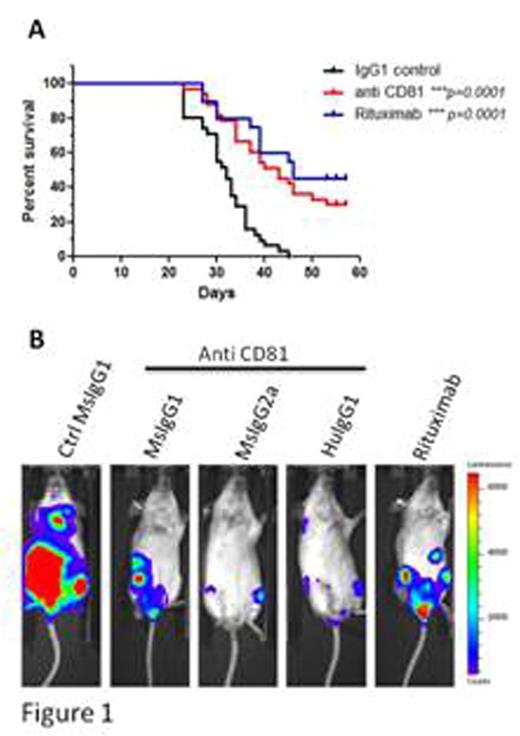Abstract
The tetraspanin CD81 associates with CD19 on B cells; this molecular complex functions as co-receptor to lower the threshold of BCR-initiated B cell activation.
Recently we have shown the importance of CD81 in tumor growth and metastasis of solid tumors (Vences-Catalan et al., 2015). However, the role of CD81 in lymphoid malignancies has not been explored. Previous studies demonstrated anti-proliferative effects of anti-CD81 antibodies on human B cell lymphomas using in vitro assays (Oren et al., 1990). Here we tested the therapeutic effect of an anti-human CD81 antibody in vivo against Raji and SUP-B8 B cell lymphomas using a xenograft model in SCID mice. Our studies demonstrated that our anti-human CD81 antibody (mouse IgG1) had therapeutic effect comparable to Rituximab (human IgG1) (Figure 1A). Yet, the two antibodies differ in their ability to mediate antibody-dependent cell cytotoxicity (ADCC), Rituximab is known to be highly effective, whereas the mouse IgG1 anti-CD81 antibody is not expected to mediate ADCC.
To enhance the anti-CD81-mediated ADCC, we class switched the hybridoma to mouse IgG2a; we also engineered a chimeric antibody containing human IgG1ADCC-HIGH Fc constant region. Indeed, mouse IgG2a and the chimeric human IgG1 anti-CD81 mAb showed a remarkable increase in NK cell-mediated ADCC as well as complement-dependent cytotoxicity (CDC) when compared to Rituximab in vitro (data not shown) and in vivo (Figure 1B). These results suggest that CD81 can be a potential therapeutic target on B cell lymphomas by virtue of both its direct cytotoxic effect and as a mediator of ADCC and CDC. The humanized IgG1 version is being developed as a therapeutic candidate.
Comparable efficacy of anti-CD81 to Rituximab. SCID mice were I.V.-injected with 1.5x106 Raji-GFP-Luc cells, tumors growth proceeded for 5 days before IP injection of 4 weekly doses of 100 ug of the indicated antibodies. (A) Survival of Raji-GFP-Luc bearing SCID mice given anti CD81 (n=30), Rituximab (n=20) or control MsIgG1 (n=30).
(B) In vivo bioluminescence imaging of tumor growth in mice injected (left to right) with control mouse IgG1; anti-CD81 (MsIgG1); anti-CD81 MsIgG2a; chimeric anti-CD81 (HuIgG1) and Rituximab.
Comparable efficacy of anti-CD81 to Rituximab. SCID mice were I.V.-injected with 1.5x106 Raji-GFP-Luc cells, tumors growth proceeded for 5 days before IP injection of 4 weekly doses of 100 ug of the indicated antibodies. (A) Survival of Raji-GFP-Luc bearing SCID mice given anti CD81 (n=30), Rituximab (n=20) or control MsIgG1 (n=30).
(B) In vivo bioluminescence imaging of tumor growth in mice injected (left to right) with control mouse IgG1; anti-CD81 (MsIgG1); anti-CD81 MsIgG2a; chimeric anti-CD81 (HuIgG1) and Rituximab.
Levy:Kite Pharma: Consultancy; Five Prime Therapeutics: Consultancy; Innate Pharma: Consultancy; Beigene: Consultancy; Corvus: Consultancy; Dynavax: Research Funding; Pharmacyclics: Research Funding.
Author notes
Asterisk with author names denotes non-ASH members.


This feature is available to Subscribers Only
Sign In or Create an Account Close Modal